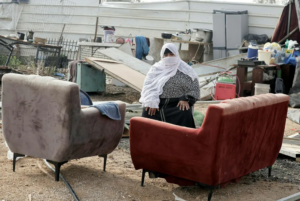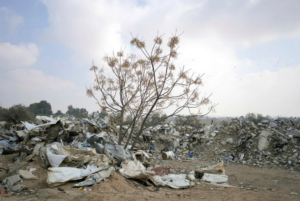Serving in Israel’s army and being attacked by Hamas didn’t protect these Bedouin

A local from Wadi al-Khalil, January 2025. The desert conditions are harsh, and there is no electricity or running water
Eden Solomon reports in Haaretz on 6 February 2025:
It’s a sunny winter’s day at the end of January, and kids are milling around in the unrecognized Bedouin village of Wadi al-Khalil in the south. They’re surrounded by the ruins of makeshift homes, uprooted trees and other debris, but today is a holiday, so the break from school fills the air with a bit of joy.
Suddenly, two white trucks from the Israel Land Authority pass by, cutting the fun short. The children quickly understand and scatter. “If you don’t fold up the tents, they bring a tractor and destroy everything,” one resident says. This happens a lot, sometimes once a month, sometimes every two weeks. The inspectors come and destroy everything.
For nine months now, the remaining residents have been living this way, ever since the state demolished the structures of the small community whose land is earmarked for part of Route 6, the north-south highway abutting the West Bank. Demolition orders were issued for 47 homes; around 320 people were told to relocate to a new neighborhood in the nearby village of Umm Batin.
But with no agreement sealed on relocation terms, the construction of new homes has yet to begin. In the meantime, about half of the residents have moved out – some renting apartments, others moving in with relatives. But not everyone can afford such a luxury. Around 150 people remain in the village.
The desert conditions are harsh, and there is no electricity or running water. Generators, water tanks and chemical toilets – some of which have been converted into showers – are makeshift solutions that offer little relief. The generators are only used a few hours a day for light and heat. When temperatures drop, the people light small bonfires. “We only run our generators in the evening because it’s a financial burden that not everybody can afford,” says Ahmed Abu Asa, 52.
According to Abu Asa, with no proper showers, many residents rely on families living in the region. “There’s no chance to get a hot meal,” he adds. “We used to have a large solar-heating system, but that was demolished too. It’s impossible to cope with these conditions. It’s especially hard for children and older people, particularly in the winter when it’s freezing at night and in the mornings.”
‘I don’t see any future’
These harsh scenes – hungry children walking among the rubble alongside elderly people struggling in the desert cold – have been life for hundreds of Bedouin in the southern Negev region over the past year. The cause is the state’s demolition of two Bedouin villages and three neighborhoods in towns elsewhere in the Negev, without offering the people adequate alternatives. And the state continues to harass them, even as they are left with nothing.
Nura Abu Asa, 53, stands next to a white minibus clutching the edges of the thin coat she’s wearing. She has lived in Wadi al-Khalil for nearly 40 years, since she married a local man. After the Israeli authorities demolished her home, the minibus became her house. “We have nothing but this,” she says. “It’s our toilet, our makeshift shower and also a place to warm up during the freezing nights.” When she speaks her voice cracks and her words become fragmented. “The cold at night. And I can’t even begin to describe our mental state – the fear of the authorities coming to demolish again, the fear for the future. This no way to live. I don’t understand what’s behind these cruel methods.”
Nura Abu Asa’s 14-year-old granddaughter, Farah, stands quietly beside her. According to Farah, no one at school knows about the demolition. And the future? “I don’t see any future,” she says. “I just want a normal life.”

The rubble left in Wadi al-Khalil
In another corner, sitting on a plastic chair amid the ruins is 50-year-old Nasr Abu Asa. He immediately starts talking about his military service. “I volunteered for a combat unit,” he says. “I thought I’d get everything I’m eligible for from the state, and look at what they’re doing to me. For four years I pushed myself: routine security deployments, ambushes, putting my life at risk in different operations, and in the end – this.” Abu Asa believes that the current generation growing up in the village won’t follow in his footsteps. “They see what the state is doing to them,” he says. He has four children; the youngest is 13. They all live with him in the ruined village. “It’s hard to explain the situation to them,” he says. “They ask why this is happening to us and when there will be a solution. I have no answers.”
The solution in question is an attempt to resolve the legal battle between the residents and the state. Initially, the residents requested that they be able to move to the nearby neighborhood of al-Mitla in the town of Tal Sheva, but it was ultimately agreed that they would be relocated to Umm Batin.
But according to the residents, the agreement doesn’t guarantee the full financial compensation they were promised. Also, the Bedouin Development and Settlement Authority is refusing to provide the 250,000-shekel ($70,520) grant they are entitled to for leaving, arguing that they weren’t relocated voluntarily but were “forced out by the enforcement authorities.”
A rare decent gesture
Among the rubble in Wadi al-Khalil, two structures are still intact. The first is relatively new, so no demolition order has been issued yet. The second belongs to an older woman who was killed in Hamas’ October 7 massacre at Re’im Junction near Gaza. At the family’s request, the authorities didn’t demolish the house, a rare gesture.
“It was the right thing to do – not taking down their house,” one resident says, “but it also shows that solutions could have been found for us as well. If they had left us with a house, we could have negotiated under a roof. After all, the building of the road – which supposedly is the reason for the demolition – is far from even starting.”
A 75-year-old woman sits in the yard of one structure. Her home was demolished and she moved into a temporary structure due to an illness that made it hard for her to cope with the harsh conditions. She sits on the ground, an inhaler nearby, surrounded by six of her young granddaughters. In a hoarse voice, punctuated by coughs, she says: “I’m a sick woman with a lot of problems. If I didn’t have a roof over my head, I wouldn’t survive.”
According to Ahmed Abu Asa, the village residents have proof that the land belonged to them before the State of Israel was established in 1948. “We filed ownership claims and not even once have we ever trespassed,” he says. “They asked us to leave, and we agreed. But when we ask the state for all our rights – legal plots, a rural lifestyle, compensation and authorization to rebuild – they impose unfair conditions.”
A local from Wadi al-Khalil, last week. The desert conditions are harsh, and there is no electricity or running water.Credit: Ilan Assayag
For its part, the Bedouin Development and Settlement Authority said: “The family has been offered housing in Umm Batin, which is not far from the area they settled in. The neighborhood is ready, with empty and developed plots. Unfortunately, over the years, the family refused to discuss the possibilities and accept the solutions and financial grants that were offered them.
“After their persistent refusal, eviction requests were submitted by the enforcement agencies. Petitions against the orders were filed with the High Court and unanimously rejected. In the absence of a resolution, the eviction was carried out in May 2024. Throughout the period leading up to the eviction, it was made clear to the families that, according to existing decisions, if they were subjected to forced eviction by the enforcement authorities, they would lose their eligibility for compensation. The family, however, remained adamant in its refusal to settle.”
The Israel Land Authority said it had not ordered the eviction, which was carried out “according to orders from the Real Estate Enforcement Division and under its jurisdiction under the Planning and Building Law. After the land was cleared by the Real Estate Enforcement Division, several attempts were made to unlawfully re-invade the land illegally. Once it was made clear to the intruders that trespassing on public land is a criminal offense and legal action would be taken, the intruders chose to vacate the land on their own without the further involvement of the authorities.”
The Real Estate Enforcement Division, part of the National Security Ministry, carried out the demolition nine months ago. It said that “there is an available and regulated housing solution.” It added that the aggressive enforcement against the pitching of tents since the demolition has been carried out by the Israel Land Authority.
This article is reproduced in its entirety
